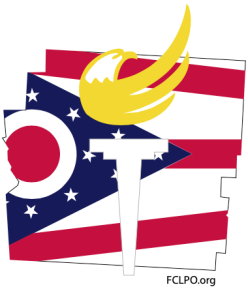In a filing to the Ohio Elections Commission at its hearing May 8, 2015, the Ohio Republican Party admitted to spending $300,000 to pay the law firm representing a “guileless dupe” in protesting petitions for the Libertarian gubernatorial candidate, and effectively kicked the Libertarian Party off the 2014 Ohio Ballot. (This figure is now estimated to be greater than $575,000).
This is the smoking gun that the Ohio Republican Party rigged the 2014 election to favor their unpopular candidate and avoid true choice on the Ohio ballot.
Help us get candidates on the ballot! Join Today!
Contact FCLPO

The long story, including juicy details
In 2014, Charlie Earl, Libertarian candidate for Governor, submitted petitions containing 1,478 signatures, far more than the 500 signatures required by law. After Secretary of State Jon Husted’s office unofficially indicated that the petitions were acceptable, it received a protest that some of them did not include a properly completed statement naming the employer of a paid circulator (who in fact was an independent contractor). This statement is required by law, but was never enforced. Following that protest, petitions containing over half of Charlie Earl’s signatures were invalidated, disqualifying him from the ballot. Because the protest was filed at the last minute specified by law, Mr. Earl had no opportunity to respond to the protest or to take any corrective action. It therefore became impossible for the Libertarian Party to secure the 3% vote for governor required to stay on the ballot. This was one of the issues in Libertarian Party of Ohio v. Husted, which the Ohio Supreme Court unanimously decided in favor of the Secretary of State (Source). A second suit filed at the same time, State ex. rel. Linnabary v. Husted, was filed by Attorney General candidate Steve Linnabary, whose petitions was rejected on the same grounds.
The Ohio Republican Party’s involvement
Ohio law requires that a protester must be a member of the same political party as the candidate. The protester in this case was Gregory Felsoci, a carpenter and registered Libertarian living near Akron. The judge in an opinion referred to Mr. Felsoci as a “guileless dupe,” whose testimony “lacks even a basic understanding of the nature of the protest he agreed to sign.”
Testimony revealed that an operative in the Kasich for Governor campaign, Terry Casey, with the help of a local Republican, found Mr. Felsoci and persuaded him to sign the protest. Despite having very limited means, Mr. Felsoci was soon represented by the high-power Columbus law firm of Zeiger, Tigges & Little. Mr. Casey testified in September that he took responsibility for paying Mr. Felsoci’s legal bills, and would look for donors to pay them.
The “donor” turned out to be the Ohio Republican Party (ORP). In a filing to the Ohio Elections Commission at its hearing May 8, 2015, the ORP admitted to spending $300,000 to pay Zeiger, Tigges & Little the costs of representing Mr. Felsoci (newspaper story). (This figure is now estimated to be greater than $575,000).
The extraordinary timing of the protest was made possible by e-mails and texts made between Mr. Casey and two employees of the Ohio Secretary of State, Matt Damschroder (Director of Elections) and Jack Christopher (General Counsel), which began two weeks before the protest was filed.
These facts make it clear that the Ohio Republican Party and Gov. Kasich’s campaign conspired to keep Charlie Earl off the ballot, fearing that the Libertarian vote in a close race would have resulted in a Democratic victory for governor.
There is no evidence to suggest that Gov. Kasich had any personal knowledge of Mr. Casey’s or the ORP’s activity. This is to be expected. Campaign operatives take great care to hide such operations from their candidates, to give them “plausible deniability.” However, it would be fair to question the Governor about the character of the people he retained to work for his election.

